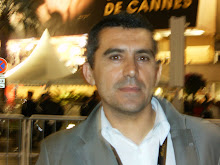Indielisboa 2006:

By José Vieira Mendes (Lisbon 2006)
Perpetual Movements.First of all and without any critical point of view about the films presented, it is nice to have a film festival like IndieLisboa that really promotes contemporary Portuguese movies. A festival like this is a great opportunity for the release of these films that usually do not reach commercial cinemas. This selection of Portuguese cinema — including the retrospective and the short films, but mainly the four feature films — represents a view of a new generation of filmmakers (in their 40's) of our country and its development as a member of the European Union: the culture, music, Euro Football Cup 2004 and its consequences for the people, the recent history before the Revolution of April 1974, the landscape more and more destroyed by urban pressure, and finally the country's inertness immersed in a deep economic crisis and in a collective depression. Another topic of the Portuguese movies shown in IndieLisboa 2006 was a certain combination between documentary and fictional feature films.
IndieLisboa presented in the main sections four Portuguese features, three of them documentaries Slightly Smaller Than Indiana (Um Pouco Mais Pequeno que o Indiana) by photographer Daniel Blaufuks, in the International Competition, Perpetual Movements — A Tribute To Carlos Paredes (Movimentos Perpétuos — Cine-tributo a Carlos Paredes) by Edgar Pêra, On Edge (À Flor da Pele) by Catarina Mourão, and Skin (Pele) by Fernando Vendrell, in the Observatory section.
Perpetual Movements — A Tribute To Carlos Paredes by Edgar Pêra — winner of the Best Cinematography in a Portuguese Feature Film and Best Portuguese Feature Film — is, from a technical point of view, a documentary. But in the hands of Edgar Pêra it is more than that. It is a beautiful montage of archive images about Carlos Paredes — one of the most celebrated national icons — the genius of the Portuguese guitar. His voice is used as a narrator where he talks about himself and his method, combined with interviews and statements by prominent personalities in Portuguese culture — the musicologist Rui Vieira Nery, the poet José Jorge Letria, and Paulo Rocha, who directed The Green Years (Os Verdes Anos) in 1963, with music composed by Paredes — and also other great admirers of the guitarist. All these fragments are arranged by Pêra, who creates a kind of parallelism between the past and the present, in a beautiful and touching homage to a musician whop died two years ago, helping us to know the man before the artist.
On Edge, a documentary by Catarina Mourão, is also a film about our country and our people behind the shadow of the last Football EuroCup. During the summer of 2004, Catarina Mourão, with João Ribeiro, a wonderful cinematographer who worked on a lot of Portuguese documentaries, shot the residents, but mainly the children, who live in a socially deprived neighbourhood in the city of Oporto. Mourão filmed children playing in the street, their funny childish conversations, girls in bikinis sunbathing in small football field, and young boys dreaming of becoming football stars someday. A life lived apart from the adults, who have spent the summertime watching the matches on television and cheering and crying at the National Team’s victories and defeats.
The metaphor of the EuroCup 2004 and the national megalomania of the new stadiums is the subject of Daniel Blaufuks's Slightly Smaller Than Indiana, also shot by João Ribeiro. Using images from the past such as postcards and contemporary images shot during a trip made by Blaufuks around the country after the championship, he shows a small Portugal —smaller than the North American state of Indiana — as outdated in its mentality, culture and economy when compared with other European countries.
Finally, Skin by Fernando Vendrell, a fiction film with some musical style. Itis also a Portuguese story which takes place in Lisbon at the beginning of the 70's, before the April Revolution and the winds of liberty and equality were brought by it. It is the story of Olga (Daniela Costa, a beautiful woman and a great discovery as an actress), who see her life change because she is a young half-caste to which she responds by going from being a biology student to a career in theatre where she celebrates her half-blackness. Skin is a film that resembles a soap opera, very successful in terms of the audience of Portuguese television.
José Vieira Mendes
© FIPRESCI 2006
José Vieira Mendes is a graduate in mass communication and journalism from Lisbon Technical University. He has been editor-in-chief of "Premiere" (Portugal) since 1999, when the movie magazine was launched in Portugal.
top





